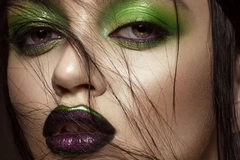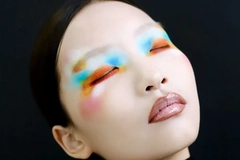California becomes first US state to ban cosmetic plastic microbeads and glitter
Key takeaways
- California passed a bill banning plastic microbeads in leave-on cosmetics, taking effect January 2029.
- The ban on plastic microbeads in leave-on cosmetics will take effect in 2029, and plastic glitter will be banned from 2030.
- The bill marks California as the first US state to ban plastic microbeads in leave-on cosmetics.

California has emerged as the first US state to ban plastic microbeads in leave-on personal care and cleaning products. Assembly Bill (AB) 823 passed the Senate Floor last week and will take effect on January 1, 2029. Another year will allow the selling out of stocks before additionally banning the sales of cosmetics containing plastic glitter in 2030.
The US banned plastic microbeads in rinse-off cosmetics in 2015, however, they are still permitted in leave-on products.
“More research has emerged revealing that personal care and cleaning products we use daily include plastic microbeads. These are pervasive pollutants in our oceans, rivers, soil, the air, and our bodies. It is a public health crisis,” California Assemblymember Tasha Boerner tells Personal Care Insights.

“I have seen the industry naturally pivot in this direction, and the European Union has banned plastic microbeads in makeup, so this is possible. California can be the state that takes action in the US and leads other states to follow suit.”
Advocates from 5 Gyres Institute, Breast Cancer Prevention Partners, Californians Against Waste, and Clean Water Action worked together to move this bill forward in the legislative process. California Governor Gavin Newsom still needs to sign the bill for it to become law.
Nancy Buermeyer, director of Program and Policy at Breast Cancer Prevention Partners, stresses that “microplastics aren’t just an environmental issue, they’re a direct threat to human health.”
 Microplastics can pollute waterways and ecosystems and lead to severe health conditions.“These toxic particles are showing up throughout our bodies and have been linked to cancer, dementia, and reproductive harm. While microplastics may seem small and insignificant, daily exposure allows them to easily make their way into us, where they don’t just pollute our bodies — they increase our risk for diseases like breast cancer.”
Microplastics can pollute waterways and ecosystems and lead to severe health conditions.“These toxic particles are showing up throughout our bodies and have been linked to cancer, dementia, and reproductive harm. While microplastics may seem small and insignificant, daily exposure allows them to easily make their way into us, where they don’t just pollute our bodies — they increase our risk for diseases like breast cancer.”
Buermeyer says the new bill will allow California to set a national precedent.
A ban for the industry
Boerner says a ban would ensure that the cosmetics industry produces safe, clean products.
“Consumers want safer products, and that call is answered with AB 823. Companies like L’Oreal are already making strides in the industry for clean beauty. This is where the market is going,” she says.
“Making our state and country healthy again starts with the products we use daily to clean our homes and bodies.”
Plastic microbeads for leave-on products are banned in the EU through its Microplastic Restriction program. It started on October 17, 2023, and will continue until 2055 with continuously updated regulations.
Meanwhile, South Africa recently proposed banning plastic microbeads in cosmetics. If approved, the ban would apply to the production, import, export, and sale of all products containing plastic microbeads.
Suggested time frame
According to Boemer, implementing the bill in January 2029 will ensure that products are reformulated to contain natural alternatives to toxic counterparts.
 Implementing the bill in January 2029 will ensure that products can be reformulated.Meanwhile, an additional year of selling through the personal care products that contain plastic glitter ensures that there is time for the industry to reformulate its products and that retailers can sell their stock.
Implementing the bill in January 2029 will ensure that products can be reformulated.Meanwhile, an additional year of selling through the personal care products that contain plastic glitter ensures that there is time for the industry to reformulate its products and that retailers can sell their stock.
“This is a first-in-the-nation ban, meaning many products must be reformulated,” says Boemer.
“When these particles are washed down the drain, they are too small to be captured by wastewater treatment systems and are released into our waterways. We see them in livestock and fish that people [eat]. Contaminated water is also used in our soil and ends up in our food.”
Long list of health concerns
When asked about the main public health concerns regarding plastic microbeads in cosmetics, Boemer says: “It is a laundry list.”
“Plastic microbeads have been found in feces samples from babies, ten times more than in those of adults. The plastic microbeads in our products have been detected in human lungs, blood, placenta, and brain tissue, and have been linked to chronic health conditions, including abnormal tissue growth,” adds Boemer.
Researchers at the University of Birmingham, UK, previously expressed concerns about the misconception of microplastics in leave-on personal care products such as lipstick, sunscreen, hand sanitizer, deodorant, and nail polish. In a study, they demonstrated how regulators overlook leave-on products and the potential risks to human safety that long exposure causes.













